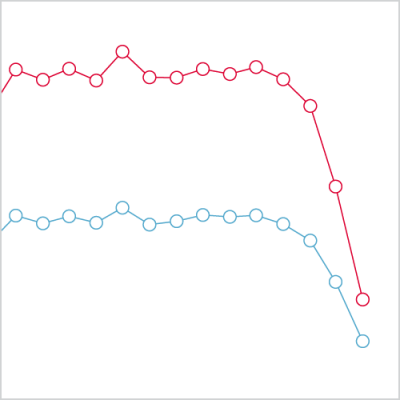Key points
• New data published by NHS England show the coronavirus (COVID-19) pandemic has had a seismic impact on how people are using health services.
• In April 2020 – the first full month of lockdown – the number of A&E visits more than halved compared to the same month in 2019.
• While this shift does ease the immediate pressures on the NHS, it could mean that potentially urgent health problems are going undiagnosed or chronic problems are getting worse.
What do the latest data tell us?
The NHS publishes data every month on the number of visits to A&E departments in England, how long patients wait for treatment and how many are admitted to hospital. A&E attendances have steadily risen over time with a typical month seeing around 2 million visits.
A&E services have remained open throughout the coronavirus lockdown, but there were only 916,581 attendances in April 2020 – a 57% reduction from the 2.1 million visits in the same month last year. Visits to the major A&E departments that treat patients with life-threatening illness and injury fell by 48%, while minor injury units and urgent care centres saw visits fall by 72%. The total number of emergency admissions also fell by 48% in April 2020.
Do we know why fewer patients are visiting A&E?
Urgent work is needed to understand why fewer people are using A&E. Changes in behaviour brought about by the lockdown may be part of the reason, for example there may be health benefits for people with lung and heart conditions from the reduction in air pollution and restrictions on non-essential travel may have led to fewer injuries from road traffic accidents.
However, some people may also be reluctant to use the NHS during a global pandemic, either due to concerns about being exposed to coronavirus or a desire to ‘protect the NHS’ from additional pressures.
There are concerns that if people are not accessing the care they need we risk storing up higher levels of health problems for the future. This has led to the chief executive of NHS England and NHS Improvement, Sir Simon Stevens, to stress that the NHS is still there for patients who need urgent and emergency care.
Are other health services seeing similar reductions in demand?
The lag in data means the impact in other parts of the NHS will only start to become clearer over time.
The latest NHS Digital data on GP appointments show a 30% fall in the overall number of appointments in March 2020. Face-to-face appointments have fallen and partially offset by a rise in telephone appointments.
NHS England data on referral to treatment times for consultant-led care show a 30% reduction in the number of new patient pathways in March 2020, which suggests fewer patients were referred into secondary care by a GP. Fewer patients completed treatment pathways in March 2020, with a 32% reduction in inpatient treatment and 11% fewer day case and outpatient care pathways (11%).
The number of people urgently referred for suspected cancer also fell, with 181,873 referrals in March 2020 compared to 198,418 the previous year – an 8% reduction.
Further reading
Work with us
We look for talented and passionate individuals as everyone at the Health Foundation has an important role to play.
View current vacanciesThe Q community
Q is an initiative connecting people with improvement expertise across the UK.
Find out more


